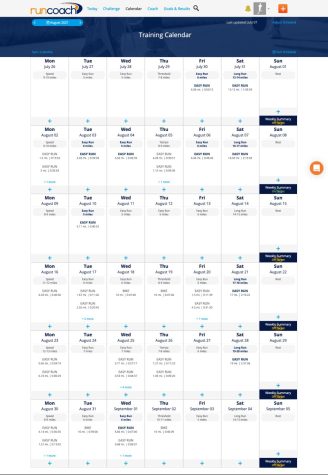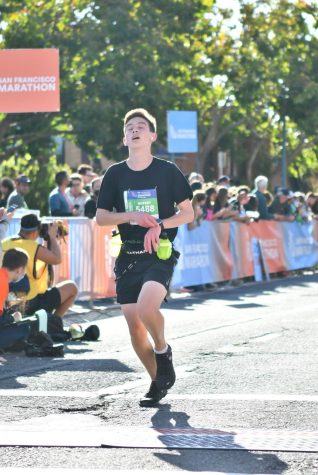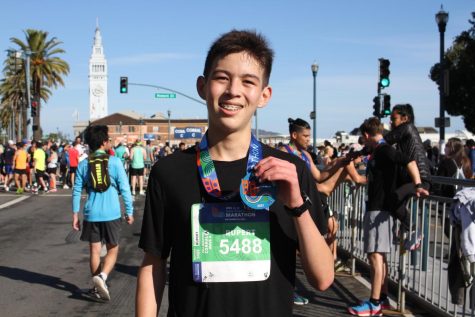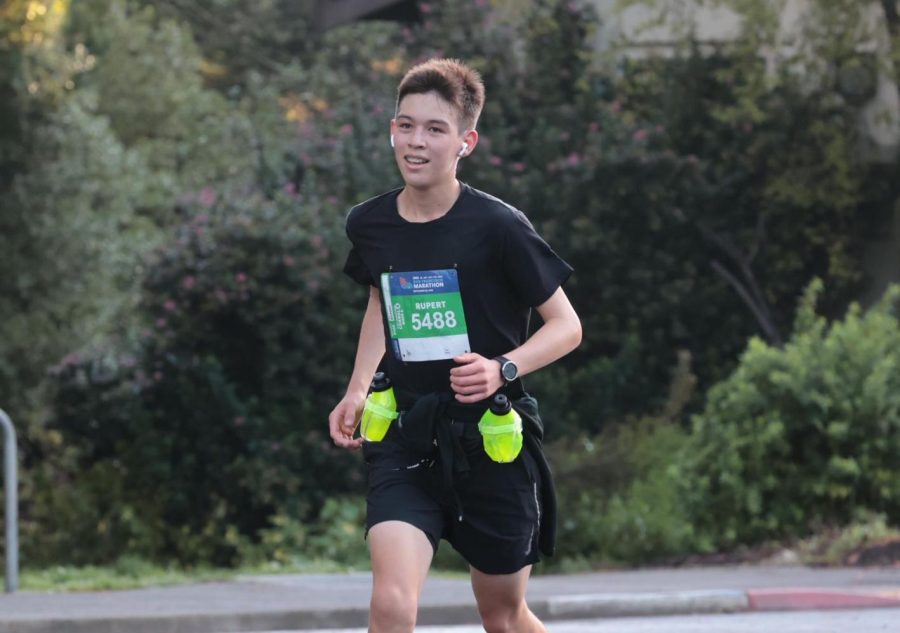Apex: Crossing the finish line
 As he entered the final miles of the race, a single thought ran through Rupert Chen (11)’s head: how much of the race was left?
As he entered the final miles of the race, a single thought ran through Rupert Chen (11)’s head: how much of the race was left?
Though every aspect of training for and running the marathon required extreme physical and mental prowess, the home stretch proved especially challenging. Exhaustion and burnout began to kick in — and with it, doubt. The finish line was within reach, perhaps even within sight, yet, to Rupert, it felt so distant. In the face of both physical setbacks and mental blocks, Rupert powered through, blazing across the finish line with a time of 3:26:14.
Rupert took part in the San Francisco Full Marathon on Sept. 19, finishing first among the 16 and under age category and 182nd among the 3180 total participants. The race began at 5:40 a.m. near the Ferry Building, taking runners under the towering metal ropes of the Golden Gate Bridge, through the lush meadows of Golden Gate Park and along the exuberant streets of Mission District before concluding by the Bay Bridge. As they ran in the chilly morning breeze, participants — wearing their athletic gear and racing bibs — enjoyed views of the sun rising over San Francisco’s dense hills.
Although this was his first full-length marathon, Rupert is no stranger to endurance exercise: until third grade, he lived in New York, where he trained for and participated in several century bike rides — 100-mile-long rides that are typically sponsored by cycling clubs. He shifted to running after moving to California, completing a half marathon without any sort of training in fifth grade and joining Harker’s cross country team in sixth grade.

“There’s something very different about running long distance versus short distance: you have to be very mentally strong when running long distance and you can’t really go off of that physical sprint mentality. You have to be mentally engaged and mentally prepared to finish,” Rupert said.
This added demand for mental fortitude is what initially drew Rupert to long-distance athletic events. As an avid Classics enthusiast, he quotes the Roman author Juvenal in describing how endurance exercise helps him achieve “mens sana in corpore sano,” which translates to “a sound mind in a sound body.”
Tackling the marathon was no easy feat — to prepare, Rupert followed an 11-week training program on Runcoach, an app designed to help runners optimize their training.
With the exception of a few low-quality air days where he substituted running with biking, he adhered strictly to the training plan created by Runcoach. Each week followed a similar structure: a few speed runs, easy runs and tempo runs during the week, a long run on Saturday and a break day on Sunday. The long runs ramped up in distance throughout most of his training, peaking at 19 miles during the eighth week of training. In the last couple of weeks, the long runs eased up to give his body a chance to recuperate before the actual marathon.

“[Runcoach] syncs with apps like Strava to analyze your running history and then creates a plan to take you to your target time, but based on whatever constraints you give it — for instance, you can switch around long run days if a certain day of the week works best for that,” Rupert said. “I felt perfectly prepared because I knew my pacing and I knew that I could hit my goal time, though I was a little nervous for the hills.”
Aside from carrying out his training regimen, Rupert took various other measures in preparation for the marathon, such as purchasing the necessary gear. He bought a pair of shoes when he first began training, and a second pair the week before the marathon after reaching the designated mileage on the first. As for hydration, he tested out both a water backpack and a water belt during training — ultimately, he opted to run with the water belt since taking off his water backpack to fill up its bladder at the marathon’s refill stations proved inconvenient.
Regarding nutrition, Rupert did not feel the need to make any significant dietary changes throughout the majority of his training. However, as most runners do, he incorporated more carbohydrates — such as chickpeas and chia seeds — into his diet the week before to build up his energy reserve.
“I’m vegetarian, so I had a whole lot of chickpeas the week of, for protein, and the day and night before I had a lot of chickpea pasta for carbs,” Rupert said.
Head Athletic Trainer Jaron Olson met with Rupert several times throughout the course of his training to discuss nutrition and assist with recovering from a knee injury.
“Rupert was attempting to run cross country consecutively with training for a marathon, so I tried to make sure he wasn’t over training by doing too much considering the high mileage he was running,” Olson said. “He was dealing with some knee pain, so we helped him care for that. I also tried to give him some tips for fueling an endurance event, [since] it’s hard to have enough stored energy on board to do a 26 mile run.”
Despite extensive training, runners often find themselves dealing with pre-race nerves in the days, hours and seconds leading up to a marathon — for Rupert, the anxiety hit when he and his family traveled to San Francisco the day before the marathon.
“When we were getting ready to go up to San Francisco, I was very nervous, but then it calmed down,” Rupert said. “The start was really chaotic, too chaotic to be nervous or anything. And then when I was running, it was just like ‘I can run, I know I can run,’ so I wasn’t really nervous then, so really the day before was the worst part of the nerves for me.”
At the beginning of the race, participants were placed in corrals based on anticipated finish times. Due to some organizational flaws, Rupert ended up starting behind the pacing group for a 4:20:00 time despite planning to run a 3:30:00 time. This mixup had both benefits and consequences for his performance.
“For the first four miles when it was flat, I didn’t really mind it because I was passing people, so it was very fun,” Rupert said. “But then crossing the Golden Gate Bridge, I got stuck behind a pacing group that I shouldn’t have been behind. It was a bit maddening to be going 40 seconds slower than I was trying to, and I couldn’t get in front of them because of the bridge.”
This frustration, along with hills in the course, heightened the mental and physical strain of the marathon. Rupert had initially planned to pick up the pace for the last 5000 meters of the race, which he equated to a cross country race.
“I planned to speed up in the last 5k,” Rupert said. “I know that distance very well because that’s the length of our cross-country races, so I felt confident in my ability to sprint through it. But that distance felt longer than I expected at the end of 23 miles, and I didn’t have the energy to really go for it. Miles 25 and 26 were my slowest, but at that point, I was just happy to finish.”

Although his plan for pacing fell through, Rupert was able to accomplish all of the overarching goals he had set for himself prior to the marathon: to finish the race; to finish ahead of the men’s median time, which is around 4:30:30; to finish within four hours; and to finish within three and half hours. His time of 3:26:14 fulfilled all of those objectives, which he was content with.
More than anything else, completing the marathon provided Rupert with a feeling of satisfaction: a sense of relief knowing that it could be done and that his training paid off. When asked whether he would run another marathon in the future, he hesitated — having just come off his first marathon.
“Finishing the race, I motivated myself by thinking, ‘after I finish this, I never have to do it again,’” Rupert said. “But it didn’t take long for that to wear off. I’d love to do another one, and I want to eventually do an ironman —I just have to nail down the swimming portion.”

Additional reporting by Claire Bauschlicher.
Tiffany Chang (12) is the editor-in-chief of Humans of Harker, and this is her fourth year on staff. She’s looking forward to telling the story of the...


















![“[Building nerf blasters] became this outlet of creativity for me that hasn't been matched by anything else. The process [of] making a build complete to your desire is such a painstakingly difficult process, but I've had to learn from [the skills needed from] soldering to proper painting. There's so many different options for everything, if you think about it, it exists. The best part is [that] if it doesn't exist, you can build it yourself," Ishaan Parate said.](https://harkeraquila.com/wp-content/uploads/2022/08/DSC_8149-900x604.jpg)




![“When I came into high school, I was ready to be a follower. But DECA was a game changer for me. It helped me overcome my fear of public speaking, and it's played such a major role in who I've become today. To be able to successfully lead a chapter of 150 students, an officer team and be one of the upperclassmen I once really admired is something I'm [really] proud of,” Anvitha Tummala ('21) said.](https://harkeraquila.com/wp-content/uploads/2021/07/Screen-Shot-2021-07-25-at-9.50.05-AM-900x594.png)







![“I think getting up in the morning and having a sense of purpose [is exciting]. I think without a certain amount of drive, life is kind of obsolete and mundane, and I think having that every single day is what makes each day unique and kind of makes life exciting,” Neymika Jain (12) said.](https://harkeraquila.com/wp-content/uploads/2017/06/Screen-Shot-2017-06-03-at-4.54.16-PM.png)








![“My slogan is ‘slow feet, don’t eat, and I’m hungry.’ You need to run fast to get where you are–you aren't going to get those championships if you aren't fast,” Angel Cervantes (12) said. “I want to do well in school on my tests and in track and win championships for my team. I live by that, [and] I can do that anywhere: in the classroom or on the field.”](https://harkeraquila.com/wp-content/uploads/2018/06/DSC5146-900x601.jpg)
![“[Volleyball has] taught me how to fall correctly, and another thing it taught is that you don’t have to be the best at something to be good at it. If you just hit the ball in a smart way, then it still scores points and you’re good at it. You could be a background player and still make a much bigger impact on the team than you would think,” Anya Gert (’20) said.](https://harkeraquila.com/wp-content/uploads/2020/06/AnnaGert_JinTuan_HoHPhotoEdited-600x900.jpeg)

![“I'm not nearly there yet, but [my confidence has] definitely been getting better since I was pretty shy and timid coming into Harker my freshman year. I know that there's a lot of people that are really confident in what they do, and I really admire them. Everyone's so driven and that has really pushed me to kind of try to find my own place in high school and be more confident,” Alyssa Huang (’20) said.](https://harkeraquila.com/wp-content/uploads/2020/06/AlyssaHuang_EmilyChen_HoHPhoto-900x749.jpeg)



